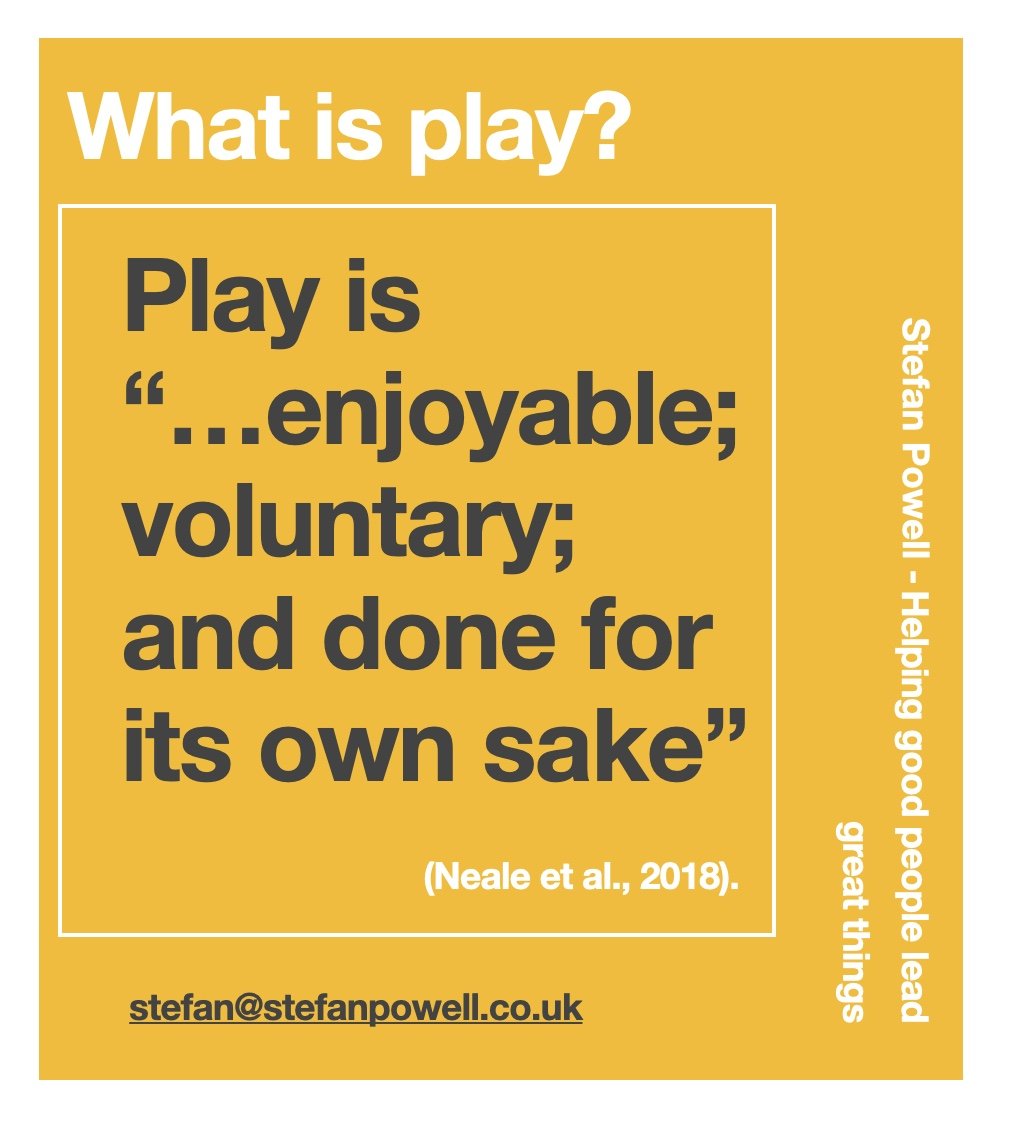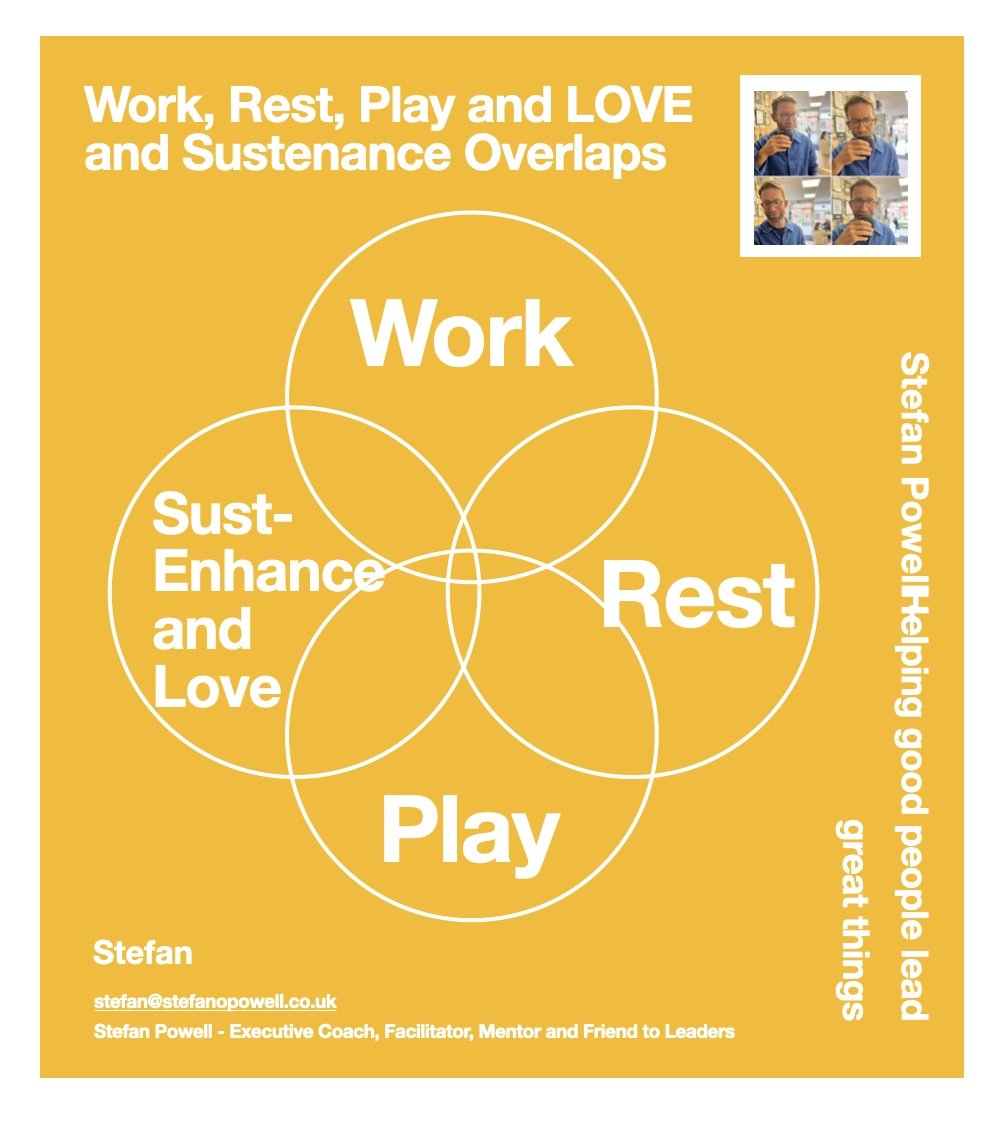Play - What’s that then?
“What's play?” I ask myself - as I’m about to write about it, long form, for the first time.
It’s one of my four life pillars and sits alongside these; WORK, REST, PLAY and LOVE AND SUSTENANCE. I know what it feels like when I do it, I know it’s important and I know it comes up in lots of my sessions with deep purposeful people; or a lack of it does.
As a coach of over 20 years experience I ask questions, listen intently to what is said and what is unsaid and reflect back what I notice.
The questions I ask, the models I use and the stories I share are informed by my own senior leadership, life, business and coaching experience but in truth they rarely require a detailed explanation of concepts- in the moment and in context the ‘snippets’ make loads of sense to the client and are just enough to catalyst my clients own own ideas and thoughts. Which is the aim.
Part of “Being a Wave” however, as I wish to be, involves explaining these concepts out of context so that both myself and my clients are able to access them away from the sessions and so that I can use them in upcoming workshops and group coaching I intend to run.
In essence, I am using these blogs as a way of ‘codifying’ and ‘compartmentalising’ what I do into revisable chunks; things that I can teach as well as coach on.
What else do I know about play?
If you don’t make space to decide what WORK, REST, PLAY and SUSTENANCE AND LOVE, look like for you and find a way to have balance in each of these AND across them - your ‘house’ or ‘you’ will eventually ‘fall down’.
Whilst advocating it for others, I’ve learned the hard way the impact of not having play.
If you’ve followed me for a while, you’ll know that I had a breakdown in 2016 which transformed my life, the way I live it and how I approach most things.
It’s informed the coaching I do and as I say - I believe the fact that I’m “…not fixed but neither am I broken” makes me a better leadership and executive coach.
So whats play to me?
To me play is:
What you'd do when no one's watching.
What makes you laugh, smile and shout out loud without thinking about it.
Can be with others
What you can do whilst being yourself and play.
Something that brings you happiness even if it doesn't to those around you (thats not as harsh as it sounds).
It's what you want to do in the selfless moment.
What do the books say PLAY is?
Neale et al 2018 says that “…we should be clear on what we mean by play in adulthood. There are three key attributes common to most definitions of play: play is enjoyable; voluntary; and done for its own sake”.
It goes on, “The fact it is done for its own sake is why, for example, someone kicking a ball around a field can be considered to be playing, while a professional footballer is not (because they are engaging with the game to earn a living, not for its own sake). Play is only play if an individual voluntarily engages with it as a desired activity in and of itself”
How does PLAY apply to the people I work with
Those I work with are are purposeful good people and good people usually care massively and over burden themselves. Many don’t always stick up for themselves (as much as they do the cause) and are often working harder than they need to.
On top of this they often end up doing more than is healthy for them, because of how purposeful they feel and because of how important they see the change they are leading, or want to lead.
Great things take time to gestate, to influence, to build and remain ‘liquid’ for a long time before becoming more solid and foundational.
This means that those I work with can be putting off PLAY for years; like I did.
Part of helping good people lead great things sometimes includes looking at how they introduce play (along side rest) back into their weekly and monthly routines. A number of my client work involves working out their ideal bi-weekly and monthly patterns and mapping activities into their diaries.
That planning might sound like ‘hell’ to some, but my oh my, it works.
What are the benefits of play
So what does play do for us? Play helps us by doing 1 of 5 things (and more):
Reduce stress: Play triggers the release of endorphins, promoting well-being and pain relief.
Enhance brain function: Challenging your mind with puzzles or games like chess, prevents memory problems and boost brainpower.
Boost creativity: Play stimulates the mind, enhances problem-solving skills, and sparks imagination.
Strengthen relationships and connection: Sharing laughter and fun fosters empathy, trust, and intimacy with others.
Stay young and energetic: Embracing playfulness boosts energy, vitality, and resilience to disease. As George Bernard Shaw said, "We don’t stop playing because we grow old; we grow old because we stop playing."
Differences between adult and child play
Believe it or not there is a difference between the way children and adults play; here are the two main differences in the way adults play:
“Adults frequently engage in playful interactions, rather than discrete episodes of play. Children, by contrast, frequently engage in episodes of play – perhaps even daily”.
Whe”n adults do engage in episodes of play, those episodes tend to be more circumscribed, more structured, and often have more defined rule-sets than children's play. Examples include games, roleplaying, escape rooms, and murder mystery parties”
How do Adults tend to play?
We’ve seen the difference in what play is, what about what adults tend to do WHEN they play.
Here are 5 main ways adults tend to play:
1. Social Interactions - “Humans are social animals, and feeling connected to others is vital for psychological and physical well-being. Copious research has found that loneliness, social isolation or dissatisfaction with your social life puts you at greater risk of psychological disorders, including depression”.
2. Hobbies and Interests - “Just as kids like to play with arts and crafts or building blocks, adults also like to spend their time working on hobbies and interests. Participating in projects, hobbies or interests is a great way to get adults playing. Adults can find enjoyment and downtime in pursuing these activities, and they can also use it as a path to further self-discovery. Many adults try out new hobbies, eventually settling on the ones that allow them to feel fulfilled and expressed”.
3. Organised Sport - “Organised sport isnt only for kids or professional athletes. Many adults enjoy playing sports, whether it’s an impromptu football game with neighbours or a community league. Sports provide adults with numerous health benefits, including physical exercise, social connections and stress relief. Playing sports into adulthood can also improve problem-solving skills and cognitive function”.
4. Games and Challenges - “Adults love to play games just as much as kids. For adults, games are a great way to let out the kid in you. The sillier the game, the better as it allows adults to remain in the present moment, filled with laughter and enjoyment. Plus, the healthy competition of a challenging or fun game is a positive thing to add to your life”.
5. Playing With Animals - “Spending time with a pet provides several health benefits, including decreased levels of cortisol, the primary stress hormone. Stroking an animal is relaxing and comforting, which is why many hospitals and assisted living homes enlist the help of furry friends to cheer up their patients. Owning an animal can meet some of your social needs for connection and provide a sense of purpose. After all, pets rely on humans to feed and love them”
6. Spending Time Around Kids - “Kids are naturally playful people. Playing with kids can also benefit adults in significant ways. If you are a parent, spending time playing with your little ones is an excellent way to forge stronger family relationships. Playing with your kids allows you to set aside time to give them your undivided attention, get to know them and participate in their world. A survey of over 37,000 kids worldwide found that those with higher family connections reported higher levels of flourishing. By playing with your kids, you help them thrive”.
What do I do to play?
As we’ve said; I’m a recovering workaholic and I PLAY far more often than I ever used to; here are my ‘go to’s’:
I watch films - When I PLAY - the films are chosen by me or chosen with me, rather than by someone else. My favourite films include Good Will Hunting, anything with Robin Williams in, Seven and most recently the Transformers series.
I ride my bike - I get type 3 fun from riding 1000km, and from pushing myself to my limits but as agreed with my cycling coach Joe Staunton - we intersperse my rides with ‘play rides’ where I get to go off - out of kilter with my training and in the absence of looking at power meters; my favourite none Dominique ride was a ride to Cheddar Gorge and back in the twilight hours with me mate Jason Hayles.
I have dinner with close friends - Great food, no flannel, no hears and greases, food I like, good chatter, I make people laugh - I feel unbound by conversion and yet everyone gets a turn
I ride with Dominique - We laugh, smiles, sing and stop for coffee (some times) and our ride in Cornwall on our 3 day trip was a highlight of the past few years.
Play draughts with the kids - Over coffee, or ideally a 1/2 of lager, at the Ventnor Exchange, it doesn’t matter who wins - just that we are playing together.
Tell stories - I love telling stories in a large group or playing guitar in a supportive space; the group are smiling and I forget myself and share a story from experience that makes us all feel good. I might put on a funny accent. When I do this at corporate gigs - I know we’re all in a safe space.
Work rest and play can overlap
Sometimes the above PLAY elements play the role of rest, sometimes they are sustaining and sometimes they are about love. Even if I bring play into work; in my mind, PLAY should never feel like work - that’s my golden rule.
When we are at work we are focused on an outcome.
When we are at work; ideally what we do is voluntary and doesn’t feel like it’s been compelled upon us.
When we are at work we should and can enjoy it. Doing it, even if we weren’t paid, is a good indicator of whether it’s remotely ‘play’ or not.
Being ourselves is play - are you yourself when you are at work?
Play is the moment when you notice nothing and everything - it’s when you are in flow. You can have this in work. Do you?
Play is what you want it to be - but you do need to play.
If you want bring play into work
Now as I’ve said bringing play into work is a great idea and this Article by Dana King Grinnel is a great read on doing exactly that; particularly the actives at the ‘bottom’ of the piece; including:
“Know how your employees like to play outside of work and show interest in their play preferences. Whenever possible and appropriate, make it accessible and encouraged.
And
“Make play part of performance conversations, tie it to bonuses, incentivize your best "play-ers."
Some questions for you
You’ll know by now that I bring questions; here are todays.
I’d love to hear your responses and thoughts at stefan@stefanpowell.co.uk
What does PLAY mean for you?
When do you PLAY?
Would you like more PLAY? and if so, which of the x types are you most in need of?
What would need to change in order for you to let yourself PLAY more?
Remember, you dont have to be great to get started, but you have to get started to become great.
Summary
What have we covered? (I find I forget and this is useful for me when writing)
Play is one of my four life pillars; WORK, REST, PLAY, LOVE and SUSTENANCE
Play is seen to be anything which is enjoyable; voluntary; and done for its own sake
My clients are good purposeful people and dont always make the time to PLAY
There are 5 main benefits of PLAYING; these are it: Relieves stress, Improves brain function, Stimulates the mind and boost creativity, Improves relationships and your connection to others and Keeps you feeling young and energetic
There are 6 main ways adults play; Social Interactions, Hobbies and Interests, Organised Sport, Games and Challenges, Playing With Animals and Spending Time Around Kids
I love the Transformers FILMS and love riding my bike with Dominique
Work, rest and play overlap but it is helpful to think of them as separate pieces of a puzzle so that they are all covered and met; all work and no play makes life dull.
There are 5 PLAY questions posed by me and I’d love to hear your answers at stefan@stefanpowell.co.uk.
Next Steps
Get in touch - If any of these topics resonate with you and you have something you’d like to share with me or if you’d like to discuss working with me on this topic.
Connect with me on linked in and read my long form posts on the rotating topics of Work, Rest. Play, Sustenance and Love every Thursday
Sign up to my newsletter ‘Be The Waves” here - which collates each weeks long form post on a monthly basis and you’ll get to read it later in the month
I’ll continue this in 4 to 5 Thursdays time when I continue the topic of ‘Rest” in my Thursday Journal.
Book an inquisitive session with me to find out more about what I do and how I do it or run a challenge or thought you have passed me.
For now; thank you
I am…
An executive coach who specialises in helping good people lead great things.Good people care about others, our planet and beauty. Great things are changes for the betterment of society and all that lives within an around it.
It sounds big and fun - it is.
I'm also an endurance racing cyclist and a go. getter.
You can read more about me and what I do; how I work here







